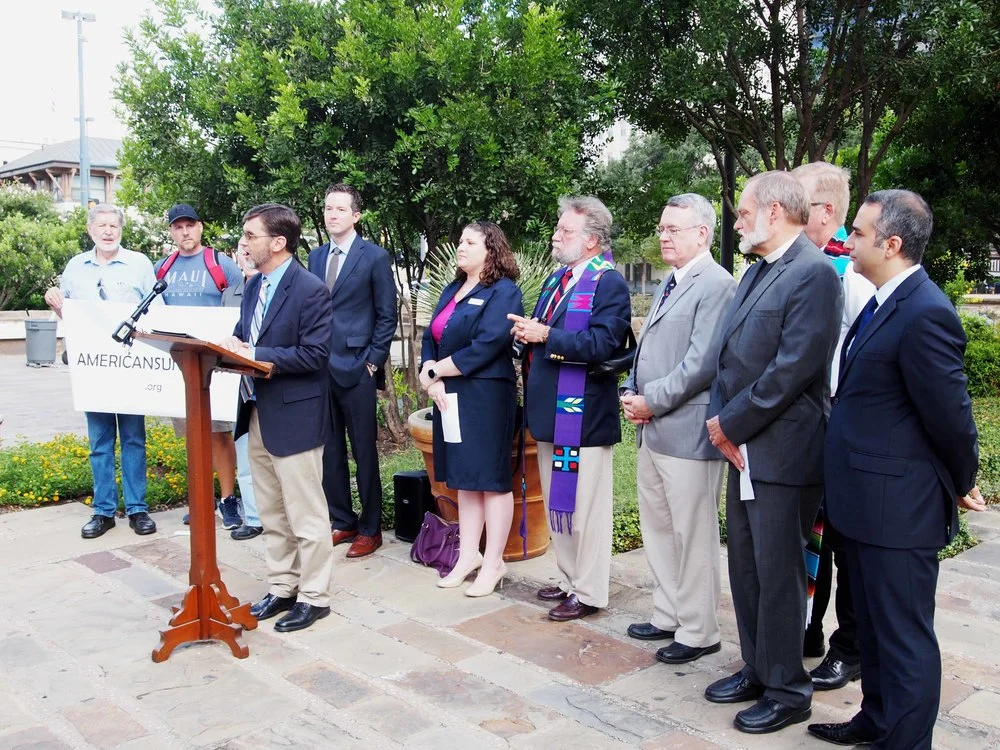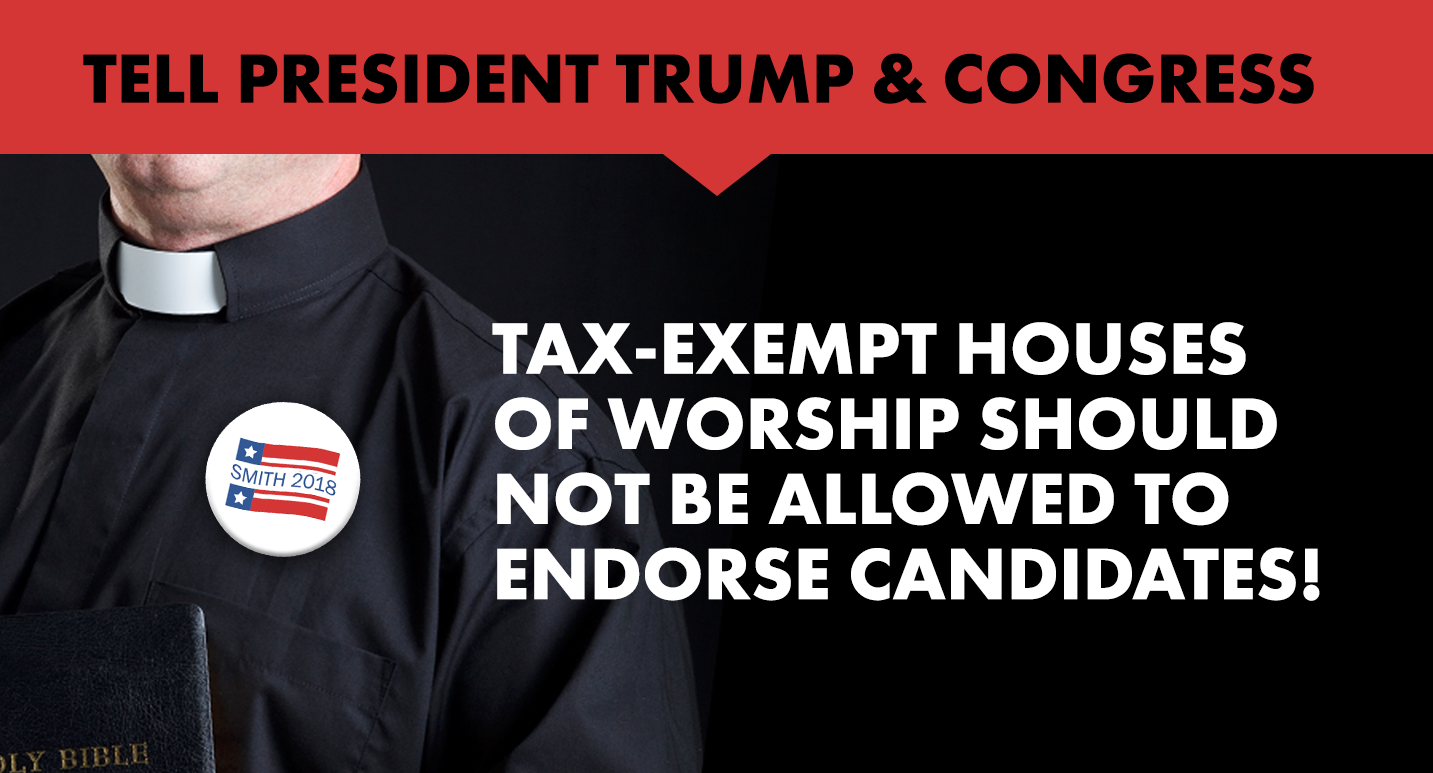




The Johnson Amendment
What Is the Johnson Amendment
& Why Should We Keep It?
The Johnson Amendment
What Is the Johnson Amendment
& Why Should We Keep It?
The Johnson Amendment protects the integrity of tax-exempt organizations by ensuring they do not endorse or oppose candidates. Americans do not want our charities and houses of worship to be torn apart by partisan campaign politics.
The American tax code grants houses of worship and other nonprofits special tax-free status specifically because they work for the common good.
The Johnson Amendment is a provision in the tax code that protects the integrity of these tax-exempt organizations by ensuring they do not endorse or oppose political candidates. At the same time, these groups maintain robust free speech rights and can speak out on any social or political issue they choose.
This law, which has been in place for six decades, is a valuable safeguard that ensures political parties and candidates seeking power can't use houses of worship and other tax-exempt organizations as their tool. In addition, it protects the taxpayer, who should not be forced to subsidize partisan election activities.
President Donald Trump has vowed to "get rid of and totally destroy the Johnson Amendment." This is a bad and widely unpopular idea. Repealing the law would divide congregations and dismantle the nonprofit structure as we know it.
That is why it is more important than ever to fight to protect the Johnson Amendment.
Reasons to Support
the Johnson Amendment:
Houses of worship can already speak to political issues:
Under current law, churches and church leaders are already fully able to exercise their free speech. Among other things, houses of worship can speak to any issue they choose from the pulpit or in public, and they can write about issues in bulletins or their website. They can also host candidate forums, engage in voter registration drives, encourage people to vote, help transport people to the polls, and more. In addition, church leaders are absolutely free to support or endorse political candidates as private citizens—just like any of us can.
Current law is a safeguard for houses of worship:
Current law ensures that sanctuaries remain sacred and houses of worship focus on fostering community and performing good works. Changing the law would fundamentally change their character and diminish the distinctive role of the church. Tying America’s houses of worship to partisan elections would divide congregants, and set houses of worship against each other along political lines. Moreover, changing the Johnson Amendment would mean that politicians will pressure churches for endorsements.
Americans don't want houses of worship to endorse candidates:
According to several recent polls, the vast majority of Americans—including the majority of people of faith and faith leaders—oppose allowing churches and places of worship to endorse political candidates while retaining their tax-exempt status. In addition, 99 religious and denomination organizations recently sent a letter to Congress telling it to protect the law. And 4,500 tax-exempt organizations just submitted a similar letter to Congress.

Efforts to Repeal the Law
Efforts to Repeal the Law
The Johnson Amendment had been relatively noncontroversial for decades and the law remains popular with the American people. Nonetheless, a small but vocal opposition to the provision has emerged and folks like Jerry Falwell Jr. and Donald Trump have been advocating for the repeal of the law.
Trump's Promise To Repeal And "Destroy" Current law
The Johnson Amendment made big news recently because, as a candidate, Donald Trump pledged to repeal the provision. He even amended the Republican Party’s official platform to explicitly include a call to repeal the law. Now president, Trump continues to repeat his promise that he will repeal the Johnson Amendment. At the 2017 National Prayer Breakfast, he pledged to "get rid of and totally destroy the Johnson Amendment." And at the May 4, 2017 National Day or Prayer ceremony at the White House, he signed an executive order aimed at limiting the IRS' ability to enforce the law.
Legislation To Repeal or Weaken Current law
Congress is already considering two bills that would repeal or weaken current law. In addition, representative Kevin Brady (R-TX), the Chairman of the House Ways and Mean Committee (the committee that oversees tax issues), has stated that in "our Republican tax reform, we're going to repeal the damaging effects of the Johnson Amendment once and for all."
In addition, a May 4, 2017 House Oversight & Government Reform joint subcommittee held a hearing designed to drum up support for legislation that would repeal or weaken the current law.
Pulpit Freedom Sunday
A large Religious Right group, Alliance Defending Freedom (ADF), has been prodding pastors to openly violate the law by endorsing or opposing candidates from the pulpit. Every election year, ADF hosts a mis-named event called “Pulpit Freedom Sunday” during which pastors are urged to endorse or oppose candidates as part of their sermons.

Polls
Polls: The majority of Americans don't want their pastors endorsing candidates from the pulpit.
Polls
Polls: The majority of Americans don't want their pastors endorsing candidates from the pulpit.
2017 Independent Sector Poll: 72% of Americans support the Johnson Amendment
2017 PRRI poll: 71% of Americans support the policy of the Johnson Amendment
2017 National Association of Evangelicals Poll: Nearly 90 percent of evangelical leaders do not think pastors should endorse politicians from the pulpit
2017 Pew Research Center Poll: Most Americans oppose churches choosing sides in elections
2016 LifeWay Research Poll: Skip the endorsements in church, say most Americans
2013 Pew Research Center Poll: Most Americans oppose political endorsements from churches
2013 Pew Research Center Poll: Most Americans oppose political endorsements from churches
2008 Pew Research Center Poll: More Americans question religion’s role In politics
2008 LifeWay Research Poll: Americans wary of political endorsements from pastors, churches









